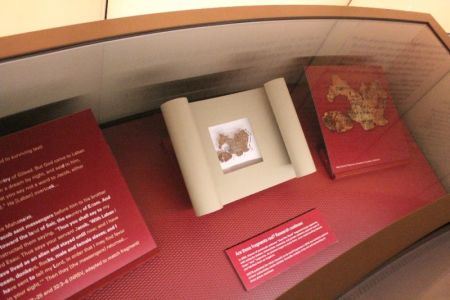Bible Museum Says 5 of Its Dead Sea Scrolls Artifacts Are Fake After 3rd-Party Testing

The Museum of the Bible in Washington, D.C. has removed from display five fragments that were thought to be from the Dead Sea Scrolls after a third-party analysis found inconsistencies.
The museum announced on Monday the results of an independent review of five of its 16 fragments that were purported to be from what is believed to be the oldest surviving fragments of biblical manuscripts.
As the authenticity of the five Dead Sea Scrolls papyri fragments that have been on display at the museum since its grand opening last November has been widely questioned, the museum sent the five fragments to the German-based Bundesanstalt für Materialforschung und-prüfung (which in English means Federal Institute for Materials Research and Testing) in April 2017.
The institute used "leading-edge technology" to perform tests that helped the organization conclude that the "five fragments show characteristics inconsistent with ancient origin," a press release explains.
The five fragments will no longer be displayed at the museum but will be replaced with three other fragments that are pending further analysis and scholarly research. Meanwhile, the exhibit will still notify museum guests that questions have been raised about the authenticity of the fragments.
"Though we had hoped the testing would render different results, this is an opportunity to educate the public on the importance of verifying the authenticity of rare biblical artifacts, the elaborate testing process undertaken and our commitment to transparency," Jeffrey Kloha, the museum's chief curatorial officer, explained in a statement. "As an educational institution entrusted with cultural heritage, the museum upholds and adheres to all museum and ethical guidelines on collection care, research and display."
The new analysis is the third research project that the museum has supported on its Dead Sea Scrolls fragments.
In July 2016, the first research report in a series of planned volumes on the fragments was published by Brill, a Dutch international academic publisher, and focused on 13 previously unpublished Dead Sea Scroll fragments.
Kipp Davis, an editor of the report and scholar at Trinity Western University in Canada, was among those who raised question about the authenticity of some of the fragments.
The museum funded Davis' continued research on the museum's Dead Sea Scroll fragments.
In 2017, Davis published a scholarly report in the academic journal Dead Sea Discoveries that prompted even more suspicions about the authenticity of some of the museum's fragments.
He believes that as many as seven of the museum's Dead Sea Scroll fragments are "forgeries."
Davis explained in a statement that his research has primarily focused on the "scribal quality," "technique in the penning of the texts," and "composition and current state of the manuscript media."
"My studies to date have managed to confirm upon a preponderance of different streams of evidence the high probability that at least seven fragments in the museum's Dead Sea Scrolls collection are modern forgeries, but conclusions on the status of the remaining fragments are still forthcoming," he said.
Kloha concluded his statement by assuring that the museum is committed to ensuring "our exhibits are presenting the most accurate and updated information."
As CNN reported that the museum founder, Steve Green, hasn't disclosed how much was paid for the 16 Dead Sea Scroll fragments in the museum's collection but similar collections of fragments have sold for millions.





















